VULCAN SOLUTIONS Case Studies Brief
Overview
Losing power is simply not an option for some. Healthcare facilities rely on electricity to provide diagnostic and treatment services, and sustain life support systems. Broadband service providers’ broadcast sites require reliable power to keep customers operational for services including voice, data, video-on-demand and interactive delivery. Both environments require reliable and continuous sources of electrical power to maintain critical continuity of operations.
The Vulcan System
Vulcan is a U.S. engineered and manufactured battery energy storage and power system. It stores energy from multiple sources and produces 120VAC/240VAC, 60Hz/50Hz at 2kW - 6kW with up to 100kWh of battery storage. Vulcan maximizes companies’ return on investment (ROI) in small scale battery energy storage with a solution that reduces installation time and complexity. Vulcan is suitable for powering medical, broadband, telecoms, IT, residential and small business electrical loads. Vulcan’s flexible and scalable architecture that can be customized to suit the power needs of different applications, Figure 1.
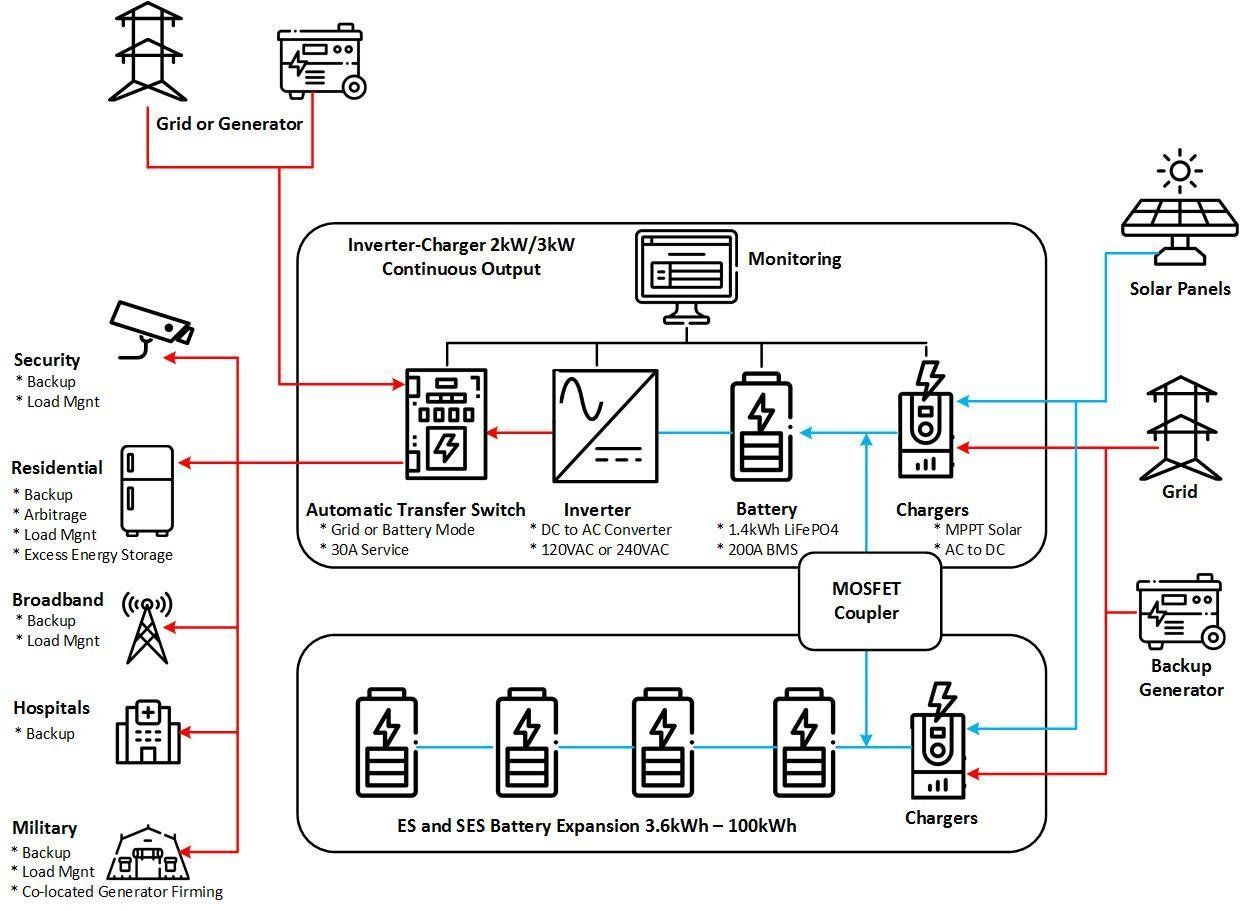
Figure 1, Vulcan Architecture and Applications. Vulcan supports multiple sector power needs.
A Wireless Internet Service Provider (WISP) Case Study - Virginia Broadband
Broadband Radio Site Backup and Load Management
Providing rural areas with broadband solutions has become much more important as remote workers and online learning require reliable internet connectivity. Commercial-grade radios are used to provide high-speed, high-capacity broadband service, including two-way Internet service via cellularized communication systems. This service utilizes the 2.5 GHz radio band and is divided into the Broadband Radio Service (BRS) and the Educational Broadband Service (EBS) to support consumers’ connectivity via a wireless device. The radio and network equipment sits at the bottom of an antenna site and connects to backhaul fiber trunk lines. These operate on 24 and 48VDC, which is driven by 120V AC-to-DC power supplies
Problem
The wireless internet service provider (WISP) customer, Virginia Broadband (VABB), requires a constant 1 source of electricity to power and sustain its rural broadband radio backhaul and relay sites and maintain customers’ internet connectivity. VABB needed a solution to backup grid power for at least 8 hours and one that could provide 24/7/365 load management based upon individual site needs. The solution had to operate under harsh conditions and fit within the physical spaces provided, typically several square meters or less.
Challenges
● Rural site locations can experience frequent power outages that sometimes extend for several days.
● Some rural sites require an off-grid electricity source.
● Rural site facilities range from exposed farm sheds to enclosed buildings, with or without HVAC. High levels of dust and dirt and extreme temperature swings are common to these locations.
Solution
The daily power consumption of a nine (9) node GigE backhaul radio site is approximately 3.5kWh. Sol Donum™ recommended one (1) standalone Inverter-charger for backup sites and one (1) 4kWh Vulcan system for each of the load management sites.
1) http://www.vabb.com/
Backup Site
The rural backup sites require one (1) Vulcan Inverter-Charger programmed for 10ms grid-to-battery switchover with NEMA 5-15R power plugs and no solar charge controller. This provides 9 hours of full backup power to the site’s radio and network equipment. Figure 2 is an installation at the base of a grain silo. This unit features an internal heating system to maintain battery longevity and system resilience under freezing weather conditions.
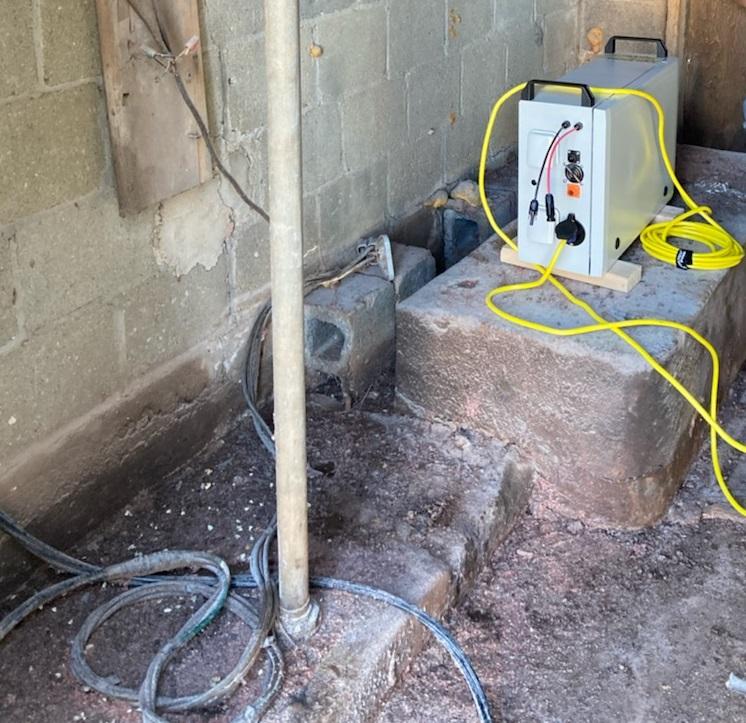
Figure 2, Situated at the base of a grain silo, this Vulcan backup unit is exposed to the elements 24/7.
Load Management Site
To determine the appropriate battery storage requirement for the load management sites, a site power study was performed. The study determined the Vulcan and solar panel configurations required to run the backhaul and relay sites off grid with a peak solar irradiation period of 4.5 hours. The following case was used to map the Vulcan and solar panels sizing to meet the off-grid power requirement with a secondary requirement of 24 hours of backup power:
● 24 hour radio and networking equipment consumption (TR): 3.5kWh,
● Minimum Vulcan 24hr storage capacity (V24) to meet TR is 4kWh with a real power output (RP) of 3.6kWh at 92% operating efficiency.
● The site radio and network equipment consumption over the 4.5hr irradiation period (SE): 0.66kWh.
● The energy that must be harvested over the 4.5hr irradiation period (TE): (V24 + SE) = 4.66kWh.
● The minimum solar panel sizing at 4.5 hours max sun (MP): TE/4.5 = 1035W
Figure 3 outlines the high level site configuration with the Vulcan, radio and network equipment connectivity:
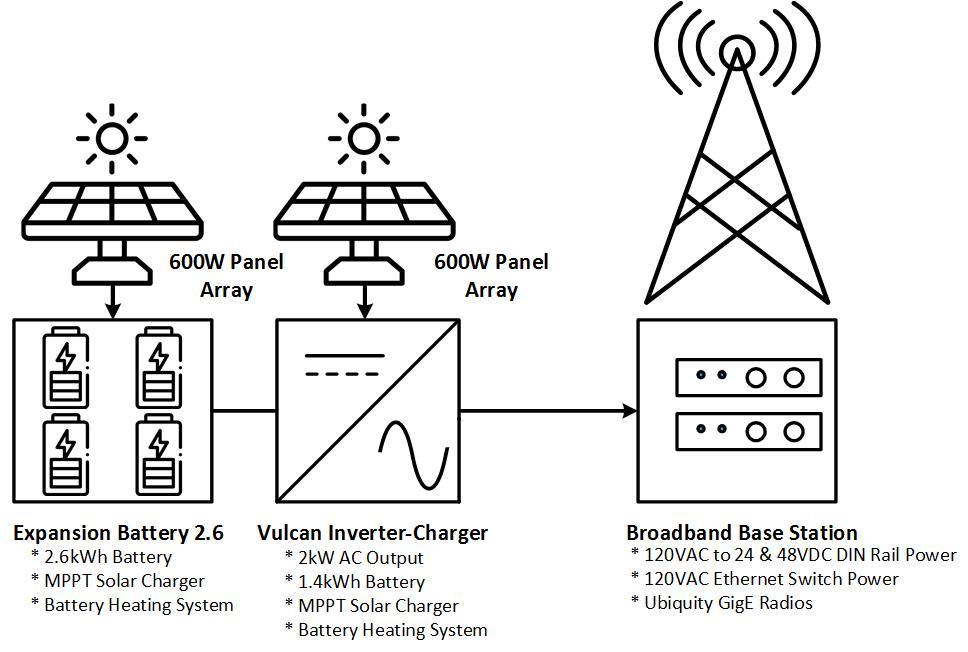
Figure 3, Load Management. Off-grid broadband solution - 4kWh Vulcan and 1.2kW panel array.
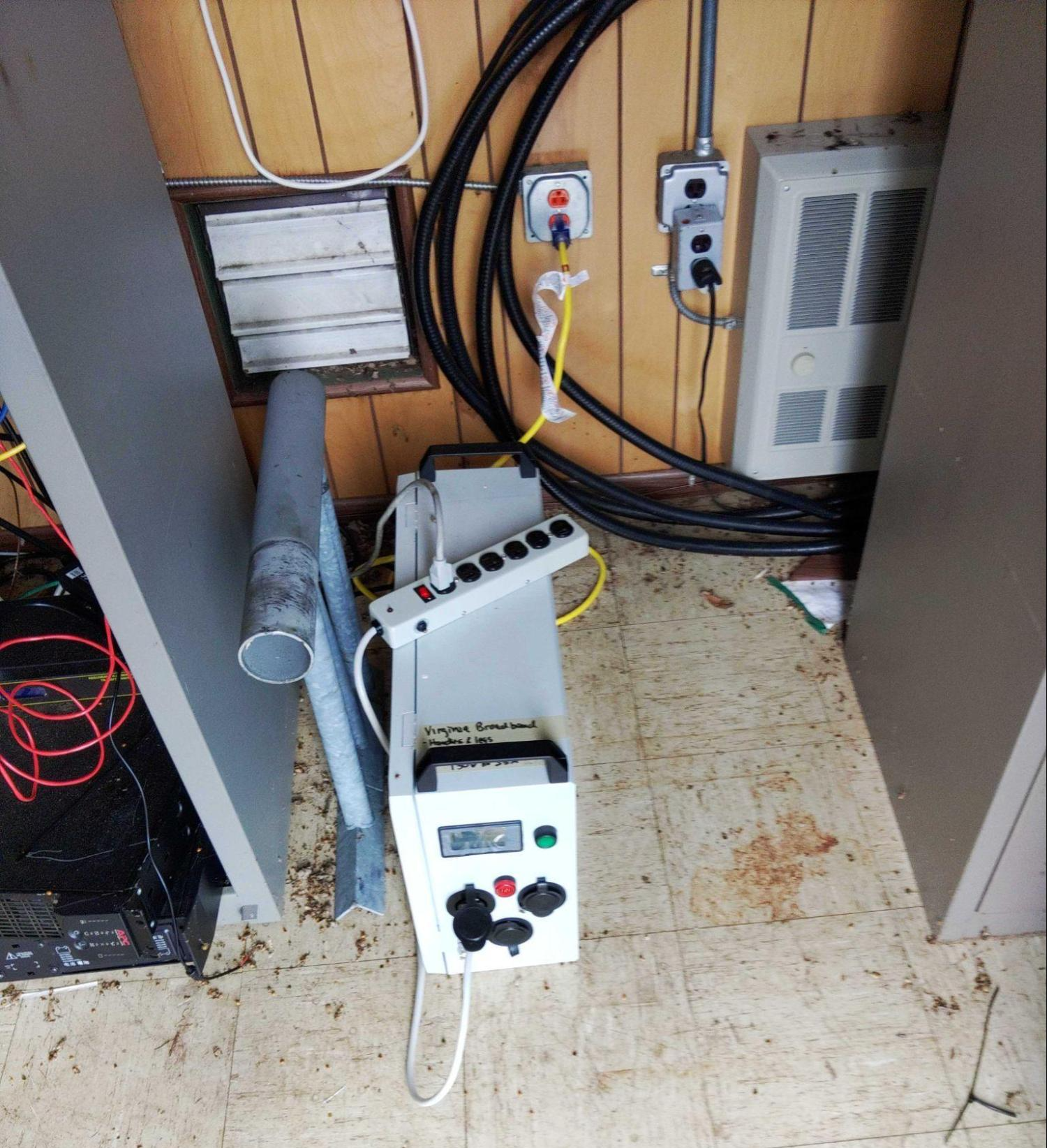
Figure 4, Alanthus Rd. Load Management Site.
Result
Vulcan provides critical load management and battery-based backup power to support radio sites where power is either deficient or where there are frequent power outages. Deploying Vulcan reduced network outages, maintenance calls and technician tower site visits as well as helped reduce power supply and radio failures. This equates to lowered cost of goods sold and lower operating and maintenance expenses for the client with the savings paying for the Vulcan deployments.
A Hospital Case Study
Critical Hospital Loads Backup A hospital’s continuity of operations relies on the consistent and uninterrupted operation of electrical equipment and systems. Inability to operate electricity-dependent Durable Medical Equipment (DME) and losing access to ePHI data processing systems such as Electronic Health Records (EHR) are examples of the disruptions that a hospital may experience during an outage. Moreover, contingency planning rules state that healthcare organizations return to normal operations as quickly as possible and ensure 2 that the confidentiality, integrity, and availability of ePHI is safeguarded to include emergency power systems to ensure the continuation of critical business processes while operating during an emergency. Lastly, electricity-dependent DME, critical care devices and IT systems can be very sensitive to AC voltage variations, dropouts and line noise making clean, reliable power vital to maintaining the operation of critical care devices and systems.
Problem
Poor grid voltage regulation, voltage sag and power spikes can cause equipment to run in an indeterminate state, shut down or become damaged. Diesel generators exhibit high failure rates in excess of 23%, have long spin up times, and can cause voltage surges, which result in a lack of hospital-wide power and equipment failures. This results in loss of equipment and data, and additional capital outlays for overtime or labor to remediate issues caused by power loss, low voltage or reactive power inconsistencies.
Challenges
● The main diesel generator can take up to 3 minutes to bring hospital power fully online. This time delay can cause IT systems to have a fault condition and cause medical devices to fail.
● Battery backup device batteries must be hot-swappable to ensure medical devices receive continuous power.
● Existing battery solutions operate as UPSs and only provide up to 30 minutes of power. This does not support prolonged outage periods.
● Power interruptions to critical equipment or IT systems can cause system shutdowns or equipment failures.
● AC voltage output must be a clean, pure sine wave. Modified sine or square waves (see figure 3) can cause irreparable damage to sensitive DME and other medical equipment.
● Battery backup equipment must be transportable for in-room use and use 20A heavy duty rated hospital grade NEMA 5-20R plugs.
● Battery backup equipment must output a pure sine wave at 60Hz as generated by the utility.
Figure 3. Modified sine wave battery backup devices can cause medical equipment that contain clocks, timers, non-isolated power supplies, dimmers and speed controllers to become damaged or to malfunction.
2) CFR-2007, Section 164.308(a)(7)(ii) Implementation Specifications, requires the implementation of an Emergency Mode Operation Plan-308(a)(7)(ii)(C) “Establish (and implement as needed) procedures to enable continuation of critical business processes for protection of the security of electronic protected health information while operating in emergency mode” to include emergency backup power systems.
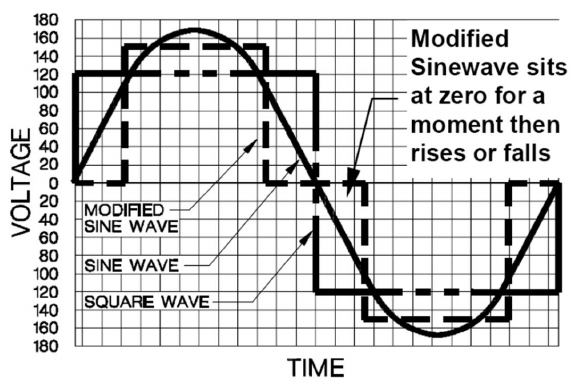
Figure 3. Type of power comparison between pure sine wave, modified sine wave and square wave.
3) ResearchGate https://www.researchgate.net/
Solution
Power requirements for most DME, critical care, lighting, security, and data processing equipment used within hospitals and healthcare facilities is 15A/20A, 115VAC/120VAC at 50Hz/60Hz. Secondly, the receptacle interface must be an extra heavy-duty design that meets or exceeds the demanding requirements of UL498 and Federal Specification WC-596G to provide a consistent means of connectivity. These allow for the lowest coincidence of plug disconnect from the outlet. Vulcan meets each of the challenges outlined to provide a battery-based backup power solution for electrical resilience in the critical care space. Vulcan’s customizable enclosure incorporates heavy-duty, self-grounding, 20A hospital grade receptacles that exceed UL498 and Federal Specification WC-596G. 4 Coupled with its pure sine wave, 2kW/3kW 120VAC output, built in 1.4kWh lithium iron phosphate battery (LiFePO4/LFP) with expansion to 100kWh and compact size, Vulcan is the right solution to power critical care, ePHI and electricity-dependent DME to HIPAA required Emergency Mode Operation Plans and ensure continuity of operations for short and long term power outages.
Result
The incorporation of Vulcan demonstrates reduced labor costs and power related equipment issues by providing clean, stable and consistent power to critical care, DME and ePHI IT equipment. With the lowering of equipment and labor costs, the savings can be used to cover the Vulcan battery system capital and O&M costs, and ensure that a hospital’s patient care continues when grid and generator power does not.
About Sol Donum™
Sol Donum™ (www.soldonum.com) is a U.S. domiciled power technology developer and integrator founded in 2019. Our products are built for operation in the toughest environments and our professional services arm provides engineering and technical support for battery storage and power solutions around our technology.
The company was founded by electrical and software engineers and information technology entrepreneurs who built their careers within the U.S. Federal Government, U.S. DoD, U.S. Intelligence Agencies and the telecom industry. We welcome your call to discuss how we may provide battery storage and services for your organization sales@soldonum.com.
4) Cooper Red, 125V, 20A
Acronyms
A - Amperes
BRS - Broadband Radio Services
DME - Durable Medical Equipment
DoD - U.S. Department of Defense
EBS - Educational Broadband Service
EHR - Electronic Health Records
GHz - Gigahertz HIPAA - Health Insurance Portability and Accountability Act of 1996
HVAC - Heating Ventilation and Air Conditioning
Hz - Hertz IT - Information Technology
KW - Kilowatts
kWh - Kilowatt Hours
LFP - Lithium Ferro Phosphate
LiFePo4 - Lithium Iron Phosphate
ms - Milliseconds
ROI - Return on Investment
UPS - Uninterruptible Power Supply
VAC - Volts Alternating Current
VDC - Volts Direct Current
WISP - Wireless Internet Service Provider
Definition of Terms
Load management provides a demand-side customer-related service. Load management services include managing power quality, power reliability (grid-connected or microgrid operation), retail electrical energy time-shift, demand charge management, and renewable power consumption maximization, which refers to charging the battery storage system during periods when renewable energy is greatest to consume the maximum renewable energy from the battery system, or in other words, charging with solar during the day or charging with wind during high wind periods.
Backup power, following a catastrophic failure of a grid, provides an active reserve of power and energy that can energize transmission and distribution lines, provide start-up power for generators, or provide a reference frequency.
Hot-swappable or hot-swap is the fitment or replacement of a part or battery while the power is still connected and active.





